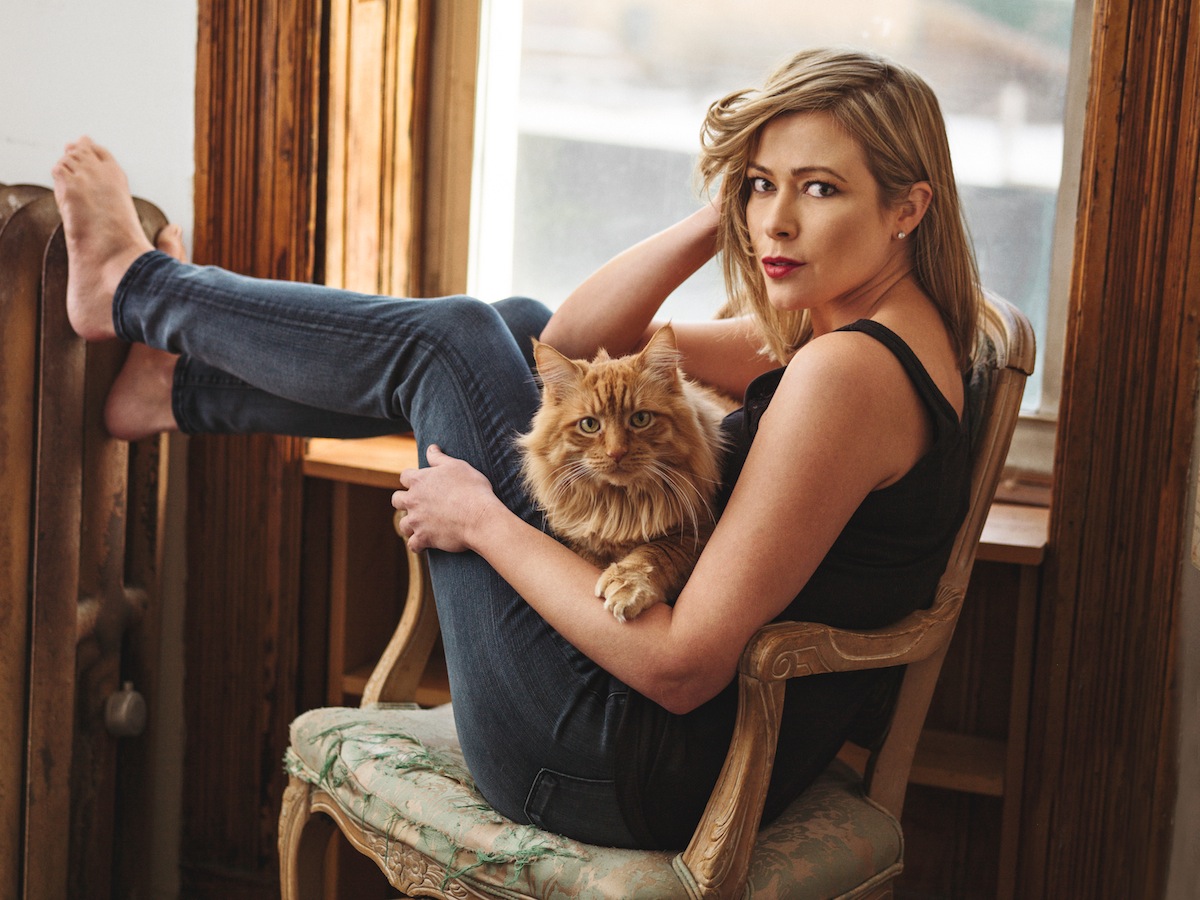Jennifer Sky’s Tokyo Story

ABOVE: JENNIFER SKY. PHOTO BY CHRISTOPHER GABELLO
Jennifer Sky’s book Queen of The Tokyo Ballroom (The Atavist) is a dark, wild, raw tale of fashion and fantasy. At 15 years old, Sky won a Seventeen Magazine modeling competition and was plucked from her rural, swampy Florida home and sent to Japan with nothing but glamorous promises. In stark, lonely, poetic prose, Sky tells the story of her dislocation in a foreign country without her parents. Her couture dreams quickly turn to horrors as she is molested on the Tokyo subway by the unseen hands of businessmen and thrown into a world where the work of child models is more escort than mannequin. Sky’s descriptions pop with Tokyo’s blinding futurism and fast paced energy to create a gorgeous nightmare of a city. Her vulnerable honesty is touching, aching, full of feeling and the intelligent hindsight of an adult. The Atavist has also created a beautiful interactive experience with the book, which downloads with a moody soundtrack reminiscent of Brian Eno and .gif of Sky taken from her early contact sheets, looking like a fresh-faced Lolita.
We spoke with Sky, now a frequent Interview contributor, about the dangers of making a girl dress like a woman, the seductive nature of style, physical displacement, trauma, what the fashion industry needs to change, and how she emerged a stronger person despite her pain.
ROYAL YOUNG: You were so young in a world where a façade of was put on you of being much older and very sexy. How did that make you feel as a 15-year-old girl?
JENNIFER SKY: At 15, I didn’t quite have the quantifiable idea that’s what they were doing. I was like a little doll they were dressing up. I grew up in a very rural town in Florida, in a kind of Swamplandia environment, looking at these beautiful pictures in fashion magazines and dreaming of that fantasy of being a model. When I had the opportunity to be one, I did whatever the adults told me to do. When you’re dealing with children_and adolescents are still children—they don’t have the agency to really understand what is happening. I didn’t know this probably wasn’t the best thing. We always want to grow up faster as teenagers. But it’s very important to take the time. I didn’t have that. There was a lot I lost. From the outside fashion is very sparkly and glamorous; but inside, it’s a cesspool.
YOUNG: I’d love to talk more about the push/pull of being very attracted to this lifestyle and then the real darkness that happens once you’re in it. I experienced it too as a young New York City creative kid, where even though I was disgusted by the people around me and what I was doing, there was still this exciting seduction.
SKY: There’s a competitive nature, especially as teenagers, and you’re still trying to figure out your social and economic value. Whenever you take kids and put them with adults manipulating children purposefully, of course we want to do what the adults tell us to do. We want to perform for them. I had an odd childhood. I was an outsider because I went to a learning disability program. I had trouble with social cues. I felt I had a lot to prove. All of a sudden I had value and I could prove it by being dressed up to look like a woman and being photographed in hypersexualized ways.
YOUNG: Absolutely. And I think all the smoke and mirrors of the entertainment industry up the stakes. Not only are you proving yourself and making the adults proud, there is this element where you look fucking gorgeous doing it. [laughs]
SKY: [laughs] Right.
YOUNG: It’s almost more dangerous because it’s wrapped in a pretty package.
SKY: That is the danger. They dress up little girls to look like women, and that gives women the image they have to compete with the rest of their lives. The ultimate problem is this a child-labor issue. These are kids being made to do things that children shouldn’t experience yet. You went through that as well, growing up in New York in the art world, and through the modeling and work you did in film. There are multiple ways that can spiral out into other, darker realms.
YOUNG: What struck me about your book was the physical displacement as well. You were taken out of your home, out of the world you knew, and sent to Japan. How did being in a totally different culture effect you?
SKY: The town in Florida where I grew up and Japan couldn’t have been more totally different. I grew up in a take-it-to-the-earth, backwoods, homestead-y kind of way. Only in rural places can you really experience this connection to the earth. This was pre-Internet and a more heightened connectivity around the world. My life was about digging in the dirt, finding dead animals in the wetlands, getting sand spurs in my feet, climbing trees. Tokyo is a future city. Japan is always 20 years ahead in the future. It was a porthole into what’s to come. I had never seen that kind of mass humanity or traffic. It felt like an out-of-body experience. I felt incredible neglect and abandonment. When I talk about the trauma I feel still, it always comes down to that, and an incredible sense of vulnerability.
YOUNG: I got that sense of trauma and vulnerability from your book. After reading it, I felt a little traumatized. [laughs]
SKY: [laughs] Oh no!
YOUNG: No! It means you did an amazing job. But what was interesting was there was no one major, horrible incident. You weren’t raped or murdered, it was more subversive and that makes it harder to deal with. And I’ve seen this with young boys, too, being preyed on in fashion.
SKY: Yes, and they feel that is what’s expected. What happened to me being touched in the subways of Tokyo was a form of rape. It was sexual assault and abuse of a minor, however subtly I presented it. If we change the expectations of the industry, we can help. If it’s expected people are going to rape, they will keep raping. It’s not okay. Whenever your body is a commodity, where is the line? There’s a fine line between model and the other side of selling your body in other ways. Nobody ever talks about this side. They talk about eating disorders. That’s scratching the surface, that’s nothing. We all have eating disorders now.
YOUNG: Yes, Americans especially have a very complicated relationship with food.
SKY: Yes, and aging.
YOUNG: You left modeling behind, but then had a successful career as an actress. You are an amazing performer, and being on camera has been a big part of your life. I’m sure you had positive experiences with it, as well as growing up and becoming more aware. How did this become a good part of your life?
SKY: I was a nowhere girl from nowhere, Florida. Maybe I would be in real estate or a county commissioner. I paid a certain price to travel, learn about the world and experience a life I would never have been able to in any other capacity. It was an extraordinary opportunity, I just wish it was safe. That’s all I’m asking. It should be positive, exciting, and wonderful for these young working girls and boys, instead of this bitter tone. Acting has similar image problems, but when I was on Xena, it was incredible. It was a world where I felt amazing control. It was a set full of women, and New Zealand is so beautiful. You’ve seen The Hobbit [laughs]. I had that opportunity and the real difference between these two industries is a union. For actors there is definable protection.
YOUNG: Did your experience, both negative and positive, make you a stronger person?
SKY: Oh for sure. I went through a serious illness in my late 20s, which made me have to retire from acting. If I hadn’t gone through these kind of trials of strength as a model and an actor I wouldn’t have been able to endure them removing half of my liver. I recovered. I refer to my past career as Navy SEAL training. They traumatize those guys, but the build them into warriors. In a way, I am a warrior. When I was sick everybody asked, “How are you dealing with this so well?” and I was like, “What do you mean? I deal with it. Being made to stand in a freezing pool for a week for a bathing suit catalogue, that was horrible too. I’m going to die if I don’t get through this. What’s the choice?”
JENNIFER SKY’S QUEEN OF THE TOKYO BALLROOM IS NOW AVAILABLE VIA THE ATAVIST. FOR MORE ON THE AUTHOR, PLEASE VISIT HER WEBSITE.






